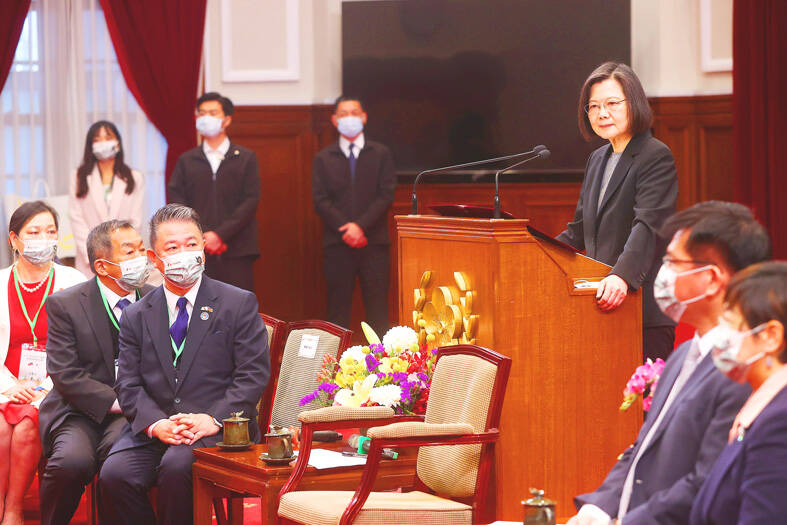President Tsai Ing-wen (蔡英文) in Taipei yesterday thanked the Taiwanese community in Japan for deepening Taiwan-Japan ties and encouraged investment in Taiwan.
The Taiwanese community in Japan has always been united and contributed greatly to friendly ties between Taiwan and Japan through civil diplomacy, Tsai told a meeting with a delegation of an association formed from Taiwanese communities in Kyoto, Osaka, Kobe, Shikoku and Hiroshima.
The association collected disease prevention supplies during the COVID-19 pandemic to give to the Japanese government, healthcare institutions and schools, exemplifying the kindness of Taiwanese, she said.

Photo: CNA
After China announced a ban on pineapple imports from Taiwan, the association purchased nearly 10 tonnes of the fruit from Taiwan and gave them to Japanese politicians and social welfare organizations to promote the nation’s high-quality agricultural products, she said.
Tsai thanked the association for caring for Taiwan, adding that its efforts have deepened the friendship between the two nations.
The joint effort of Taiwan’s government and society has meant the economy has developed steadily since the pandemic, earning the nation the No. 1 spot on Nikkei Asia’s COVID-19 Recovery Index, which the magazine published last year, she said.
The Washington-based Heritage Foundation last month ranked Taiwan fourth in the world on its Index of Economic Freedom, the nation’s best performance yet on the list, the president said.
Tsai encouraged members of the association to join the “Three Major Programs for Investing in Taiwan” that the government launched in 2019, including its “Action Plan for Welcoming Overseas Taiwanese Businesses to Return to Invest in Taiwan.”
The programs, which have been extended to next year, have so far facilitated more than NT$2 trillion (US$65.82 billion) in investments and created more than 140,000 job opportunities, she said.
She urged members of the association to continue to exert their influence in Japan and “be the backup force of the government” to win more international support for Taiwan.

Taiwan is stepping up plans to create self-sufficient supply chains for combat drones and increase foreign orders from the US to counter China’s numerical superiority, a defense official said on Saturday. Commenting on condition of anonymity, the official said the nation’s armed forces are in agreement with US Admiral Samuel Paparo’s assessment that Taiwan’s military must be prepared to turn the nation’s waters into a “hellscape” for the Chinese People’s Liberation Army (PLA). Paparo, the commander of the US Indo-Pacific Command, reiterated the concept during a Congressional hearing in Washington on Wednesday. He first coined the term in a security conference last

Prosecutors today declined to say who was questioned regarding alleged forgery on petitions to recall Democratic Progressive Party (DPP) legislators, after Chinese-language media earlier reported that members of the Chinese Nationalist Party (KMT) Youth League were brought in for questioning. The Ministry of Justice Investigation Bureau confirmed that two people had been questioned, but did not disclose any further information about the ongoing investigation. KMT Youth League members Lee Hsiao-liang (李孝亮) and Liu Szu-yin (劉思吟) — who are leading the effort to recall DPP caucus chief executive Rosalia Wu (吳思瑤) and Legislator Wu Pei-yi (吳沛憶) — both posted on Facebook saying: “I

The Ministry of Economic Affairs has fined Taobao NT$1.2 million (US$36,912) for advertisements that exceed its approved business scope, requiring the Chinese e-commerce platform to make corrections in the first half of this year or its license may be revoked. Lawmakers have called for stricter enforcement of Chinese e-commerce platforms and measures to prevent China from laundering its goods through Taiwan in response to US President Donald Trump’s heavy tariffs on China. The Legislative Yuan’s Finance Committee met today to discuss policies to prevent China from dumping goods in Taiwan, inviting government agencies to report. Democratic Progressive Party Legislator Kuo Kuo-wen (郭國文) said

The Ministry of Economic Affairs has fined Taobao NT$1.2 million (US$36,900) for advertisements that exceeded its approved business scope and ordered the Chinese e-commerce platform to make corrections in the first half of this year or its license would be revoked. Lawmakers have called for stricter supervision of Chinese e-commerce platforms and more stringent measures to prevent China from laundering its goods through Taiwan as US President Donald Trump’s administration cracks down on origin laundering. The legislature’s Finance Committee yesterday met to discuss policies to prevent China from dumping goods in Taiwan, inviting government agencies to report on the matter. Democratic Progressive Party